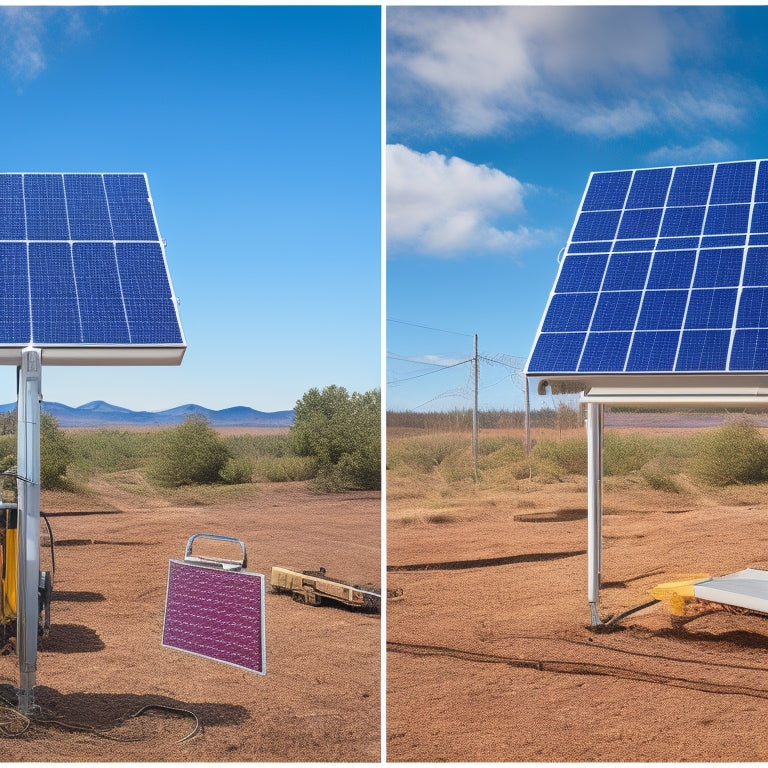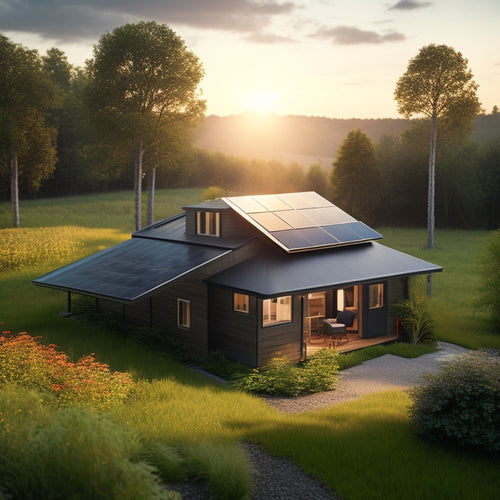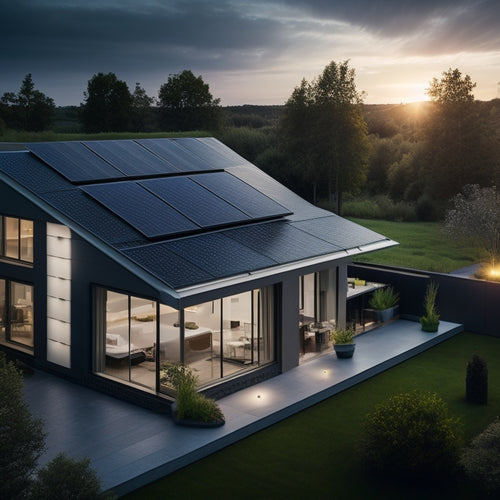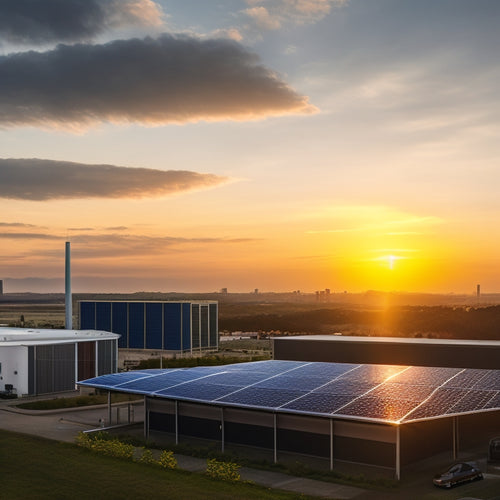
Why Permits Matter for Home Panel Installations
Share
When you install solar panels on your home, obtaining the necessary permits guarantees that the installation meets local building codes and regulations, preventing costly rework, safety hazards, and legal issues down the line. By familiarizing yourself with local building codes and electrical safety standards, you'll avoid common installation errors that can compromise system integrity and create hazards. Compliance verification is essential for safety and efficiency, and involves verification through code compliance checks. As you maneuver through the permitting process, you'll want to understand the inspections and certification process, net metering and interconnection agreements, and environmental and financial considerations that come into play.
Key Takeaways
- Familiarity with local building codes and permits ensures compliance with construction standards and avoids legal issues and fines.
- Obtaining necessary permits involves inspections and approvals, verifying that installations meet local building codes and regulations.
- Compliance verification is essential for safety and efficiency, as it helps avoid hazards and costly rework.
- Permits guarantee that installations meet electrical and fire safety standards, reducing the likelihood of hazards and liabilities.
- Permits provide a framework for quality and reliability in installations, ensuring that they meet national and local electrical codes.
Understanding Local Building Codes
Before you initiate a home panel installation project, it's vital to familiarize yourself with the local building codes that govern your area. These codes dictate the minimum standards for construction, ensuring public safety and welfare.
Understanding local building codes is key for a smooth permitting process, as non-compliance can result in costly delays or even project cancellation.
It's also important to reflect on the environmental impact of your installation, as off-grid systems can greatly reduce carbon footprints renewable energy solutions.
Additionally, researching government incentives, such as tax credits and renewable grants, can help offset the costs of your installation.
Familiarize yourself with local regulations regarding electrical, structural, and fire safety standards. Research the specific requirements for your jurisdiction, including necessary permits, inspections, and documentation.
This knowledge will help you maneuver through the permitting process efficiently, avoiding unnecessary setbacks and ensuring a successful home panel installation project.
Ensuring Electrical Safety Standards
When you're installing home panels, you must guarantee electrical safety standards are met to prevent hazards and avoid costly rework.
Inverter compatibility with battery chemistry, voltage, and charging requirements prevents damage and system failure, making it a vital aspect of electrical safety.
You'll need to comply with the National Electric Code (NEC) and local regulations, which require you to implement specific installation techniques that mitigate risks.
Electrical Code Compliance
Your electrical panel installation must adhere to the National Electric Code (NEC) and local electrical codes to guarantee the safety of people and property.
These electrical regulations dictate the minimum standards for electrical installations, making sure they're safe and efficient. You must comply with these codes to obtain the necessary permits.
The permit process involves inspections and approvals, verifying that your installation meets the required standards.
Failure to comply can result in electrical hazards, fines, or even project shutdowns.
Proper Installation Techniques
To guarantee electrical safety standards, you must focus on proper installation techniques for your home panel installation. This involves following established installation best practices to guarantee a safe and efficient system.
Here are three key considerations for proper installation techniques:
-
Panel orientation: Confirm the panel is installed at the correct angle to allow for proper airflow and heat dissipation.
-
Secure mounting: Mount the panel securely to the roof or ground to prevent damage from wind, rain, or other environmental factors.
-
Electrical connections: Make sure all electrical connections are secure, watertight, and meet the required electrical code standards.
Safety Hazard Prevention
The risk of electrical shock, fire, or even fatalities is ever-present in home panel installations, making safety hazard prevention a critical aspect of ensuring electrical safety standards.
As you oversee the installation, you must identify potential hazards through thorough hazard identification and risk assessment. This involves evaluating the panel's design, materials, and installation methods to pinpoint areas prone to electrical faults.
By doing so, you can take proactive measures to mitigate these risks, such as implementing safety protocols, using protective gear, and ensuring compliance with electrical codes and regulations.
Compliance With Fire Codes Matters
Fire safety is a vital aspect of home panel installations, and compliance with fire codes is necessary to prevent devastating consequences.
When you install solar panels on your roof, you're not just generating clean energy - you're also creating a potential fire hazard if not done correctly.
Off-grid solar systems, which provide energy independence and reduce reliance on fossil fuels and utility companies, require careful planning to guarantee fire safety renewable energy independence.
Regular maintenance strategies, including inspections and performance monitoring, are also significant to prevent potential fire hazards.
To promote fire safety, you should:
- Conduct thorough risk assessments to identify potential fire hazards during the installation process.
- Meet local building codes and regulations, which often include specific requirements for fire safety in solar panel installations.
- Schedule regular building inspections to verify that your solar panel installation meets fire safety standards and to identify any potential issues before they become major problems.
Roofing Structural Integrity Checks
Assess your roof's structural integrity before installing solar panels to ascertain a safe and successful project.
You'll need to perform a roof load analysis to determine if your roof can support the weight of the solar panels. This analysis will help identify potential weaknesses and guarantee that your roof can withstand the additional load.
In some cases, structural reinforcement may be necessary to provide added support. This could involve installing new rafters, beams, or other support systems.
By taking these steps, you can ascertain that your roof is secure and ready for the installation of solar panels.
Net Metering and Interconnection
Now that you've confirmed your roof can support the weight of solar panels, you're ready to investigate the next step: connecting your system to the grid.
This is where net metering and interconnection come into play. Net metering benefits allow you to generate your own electricity and export any excess to the grid, offsetting your energy consumption. To make this happen, you'll need to establish an interconnection agreement with your utility company.
Here are three key aspects to evaluate:
-
Net Metering Benefits: Understand how net metering benefits will impact your energy bills and overall savings.
-
Interconnection Agreements: Familiarize yourself with the terms and conditions of your interconnection agreement, including any fees or requirements.
-
Grid Connection Requirements: Verify you comply with the utility company's grid connection requirements, including safety standards and technical specifications.
Inspections and Certification Process
You'll need to schedule inspections with your local building department to guarantee your home panel installation meets code compliance.
During these inspections, the authorities will verify that your system complies with electrical safety standards, checking for proper wiring, grounding, and component installation.
Following a successful inspection, you'll receive certification, confirming that your system is safe and ready for operation.
Code Compliance Checks
Frequently, homeowners overlook the significance of code compliance checks, which can lead to costly rework or even safety hazards.
You might think that obtaining a permit is enough, but it's only the first step. Code compliance checks guarantee that your home panel installation meets local building codes and regulations.
During these checks, inspectors verify that your installation:
- Meets electrical and fire safety standards
- Complies with local building codes and ordinances
- Is installed according to manufacturer specifications and industry best practices
Electrical Safety Verification
Having confirmed your home panel installation meets local building codes and regulations through code compliance checks, the next step is to verify its electrical safety.
You'll need to schedule electrical inspections with a licensed inspector to identify potential hazards and guarantee your installation meets safety standards.
During these inspections, the inspector will conduct a thorough safety audit to detect any electrical shock or fire risks. They'll check for proper wiring, grounding, and bonding, as well as ensure that all components are rated for the installed electrical load.
Once the inspector is satisfied that your installation meets safety requirements, they'll issue a certification, providing you with peace of mind and compliance with local authorities.
Avoiding Costly Installation Errors
When planning a home panel installation, mistakes can be costly and time-consuming to rectify, which is why it's essential to avoid them in the first place.
You can't afford to overlook potential pitfalls, as installation mistakes can lead to financial repercussions down the line. To avoid these costly errors, consider the following:
-
Incorrect panel sizing: Failing to accurately calculate your energy needs can result in a system that's too small or too large, leading to inefficient energy production and unnecessary expenses.
-
Improper installation techniques: Using the wrong installation methods or materials can compromise the integrity of your system, leading to safety hazards and reduced performance.
-
Inadequate system testing: Failing to thoroughly test your system can lead to undetected errors, resulting in reduced energy production and potential system failures.
Frequently Asked Questions
Can I Install Solar Panels Myself to Save Money?
You might consider DIY solar panel installation to reap cost savings, but you'll assume significant installation risks, including faulty wiring, roof damage, and voided warranties, which could ultimately outweigh any upfront savings.
Do I Need a Permit for a Small Solar Panel Installation?
Don't assume a small solar panel installation doesn't require a permit; you'll likely need one to guarantee compliance with local solar panel regulations and installation guidelines, even if it's a DIY project, to avoid costly rework or removal.
Can I Get a Permit for a DIY Solar Panel Installation?
You'll likely need to obtain a permit for your DIY solar panel installation, as local authorities enforce solar panel regulations; however, following a DIY installation guide can help you maneuver the permitting process and guarantee compliance.
Will My Homeowners' Association Allow Solar Panel Installations?
You're thrilled to go solar, but don't assume your homeowners' association will share your enthusiasm. Check their guidelines, as they may have strict solar panel regulations, requiring approval before installation, and non-compliance can lead to costly removal.
Do I Need a Permit for Solar Panel Installation on a Shed?
You'll likely need a permit for your shed solar installation, as it's subject to local installation regulations; check with your city or county government to determine specific requirements, ensuring compliance with electrical and building codes.
Related Posts
-

Diy Off Grid Solar
By embracing DIY off-grid solar, you can break free from grid dependence, slashing your energy bills by up to 90% and...
-

Home Solar Battery
You're opting for a home solar battery that allows you to utilize the power of the sun during the day and use it at n...
-

Advantages of Commercial Solar Battery On-Site Storage
By investing in a commercial solar battery on-site storage system, you can greatly reduce your energy grid dependence...


